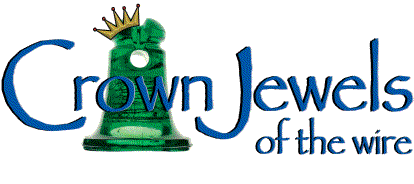Porcelain Insulator News
by Elton Gish, NIA #41
Reprinted from "Crown Jewels of the Wire", August 1986, page 23
Starting this month we will no longer use the long familiar pole line drawings
for the Porcelain Corner page. These drawings have been supplied by Robert
Winkler for the last several years. Robert has spent many hours making detailed
drawings of various pole line construction styles from early years to the
present. I want to thank him for allowing us to use these and for the drawing of
the spirals that appears in the new header for this column. Bob and Ken Stephan
have been tracing down the history of the spiral for a number of years and will
soon be able to tell us what they have uncovered as well as pictures of one in
hand.

I had a quick visit last summer with Jeannie and Joe Bridges (NIA #1027 &
#647) of Marysville, WA after meeting Jeannie the previous weekend at the Snoqualmie
Pass Tailgater. I really enjoyed the informal and friendly get-together.
I took the opportunity to visit several collectors in the area and could not
resist a chance to see Jeannie's "fat friend" (U-275) that we featured
in October, 1985 CJ. I enjoyed seeing their fine collection of glass and
porcelain insulators.

The brown glaze on one porcelain insulator really caught my eye as something
that I have seen before. It looked like it was from Imperial's late production
from 1901 to 1904. Even though the glaze was thick, you could make out parts of
the Imperial crown logo and glimpses of the rest of the Imperial markings. This
is a new style never reported and the most significant find of the year since it is a new style for Imperial. Jeannie
made a shadow profile drawing with dimensions (see description of this method in
December, 1984 CJ) so it could be given a U-#. This style was assigned U-771 and
is pictured below.

The U-771 was sold by Knowles for Imperial and a cut from their catalog can
be found on page 124 of Gerald Brown's book Collectible Porcelain Insulators
-- third edition. I
would appreciate anyone who could tell us which catalog that the U-771 appeared.
Since it was not in the 1902 edition, I would guess that it was in either the
1903 or 1904 catalogs.

They also have a very beautiful unmarked cemented two-piece porcelain power
type. It is thick bodied and, from the lily shell design, it must have been made
in the early 1900's (see the photo above). The most amazing part is that it
has an incredible turquoise colored glaze. An absolutely beautiful insulator of
classic design. I took a picture of it on slide film and was very disappointed
at the result. Apparently the polarizing filter on my camera affected the color reproduction. Sadly to say, after I got home and
had the film developed, the slide showed the insulator to be gray.
There must be other unreported insulators out there somewhere, possibly
sitting on your shelf. Why not take a good look at your collection and send me a
shadow profile drawing with dimensions and/or photo of your insulators that you
think may not have been reported, or tell us about your unusual and seldom seen
insulators. Your questions, new reports and letters of interest will be printed
here.
While we are on the subject of Imperial Porcelain Works, this would be a good
time to show you a few ads that I found. The following ad from the Electrical
Review dated 1-19-1898 is very important in that it indicates that all insulators
made by Imperial after July 15, 1897 bear the crown trademark. Of
course, most of these also bear the date of manufacture, but this indicates that
all other units without the crown were made before that date. The only exception
that I am aware of is a U-938. It has a brown glaze with only the No. 2 Imperial
marking. The brown glazed units were first made in late 1901. Naturally, units
could and were made before that July 15 date that do bear the crown logo. For
example, a U-934 dated 7-7-97 bears the crown logo and the typical Imperial
marking No. 3.

This is the earliest Imperial ad that I could locate. It is from the Electrical Review dated
October 10, 1891, the year Imperial was founded.

This next ad is from the Electrical Review dated February 20, 1892 about
three to four years before they started to manufacture high voltage insulators
for Fred Locke.

| 